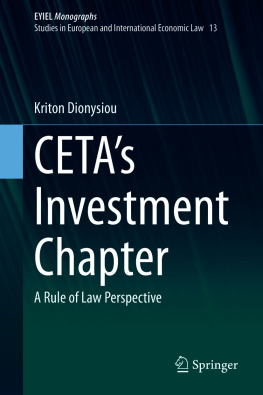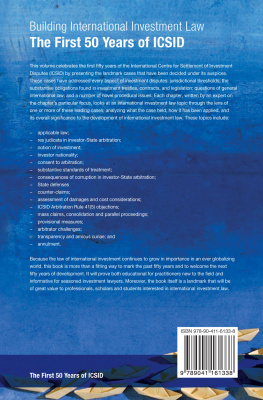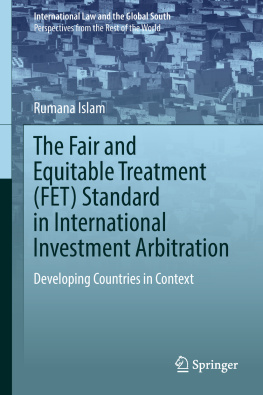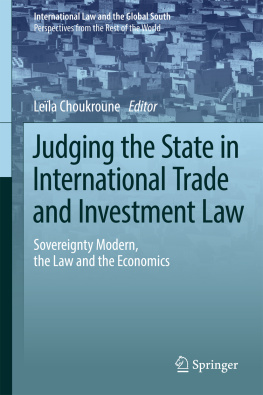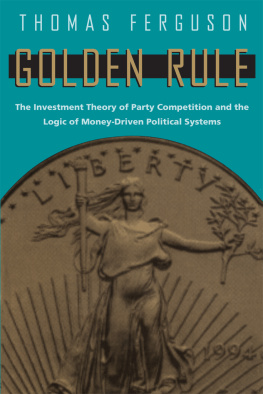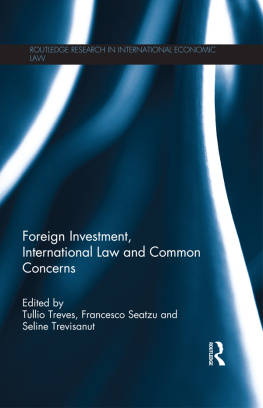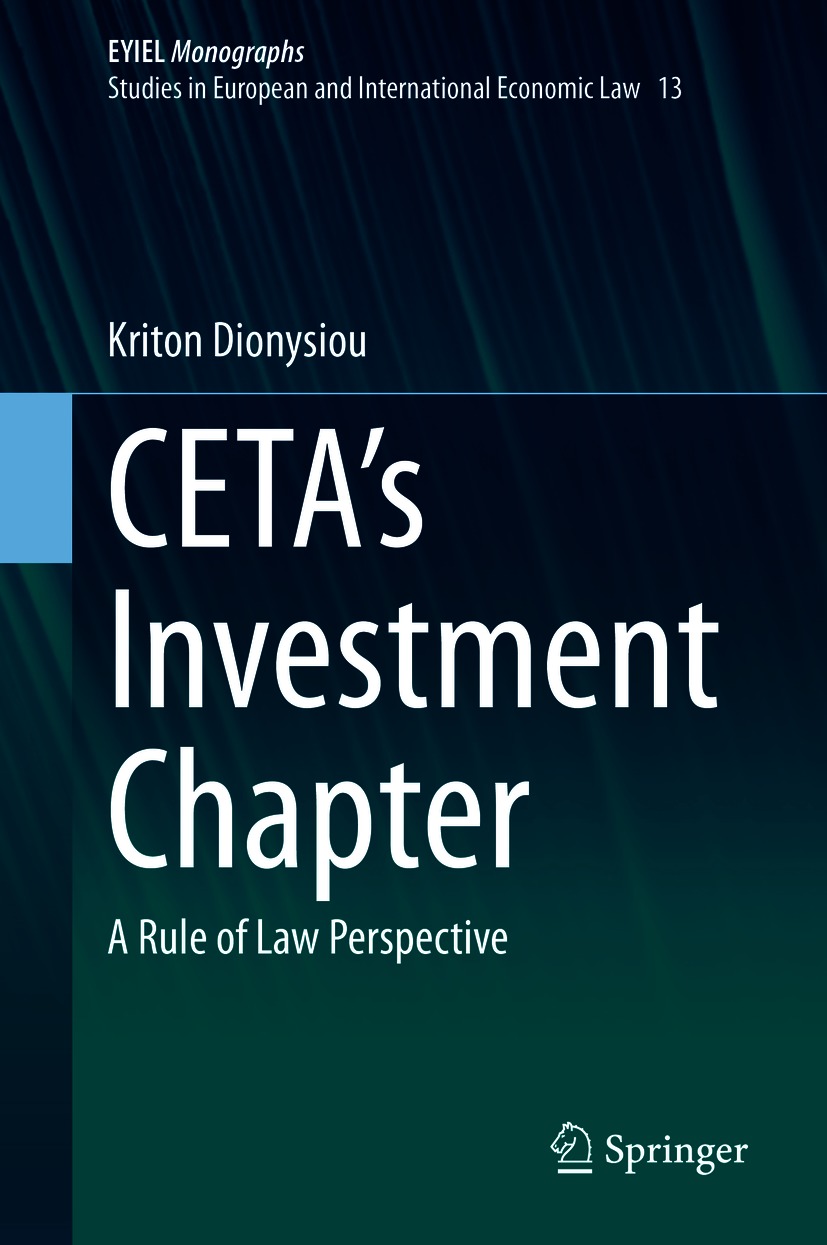Volume 13
European Yearbook of International Economic Law EYIEL Monographs - Studies in European and International Economic Law
Series Editors
Marc Bungenberg
Saarbrcken, Germany
Christoph Herrmann
Passau, Germany
Markus Krajewski
Erlangen, Germany
Jrg Philipp Terhechte
Lneburg, Germany
Andreas R. Ziegler
Lausanne, Switzerland
The European Yearbook of International Economic Law (EYIEL) is a Springer-publication in the field of International Economic Law (IEL), a field increasingly emancipating itself from Public International Law scholarship and evolving into a fully-fledged academic discipline in its own right. With the yearbook, editors and publisher make a significant contribution to the development of this "new" discipline and provide an international source of reference of the highest possible quality.
More information about this subseries at http://www.springer.com/series/15744 The EYIEL covers all areas of IEL, in particular WTO Law, External Trade Law of major trading countries, important Regional Economic Integration agreements, International Competition Law, International Investment Regulation, International Monetary Law, International Intellectual Property Protection and International Tax Law. The yearbook consists of four major parts: (1) Part one brings together topical articles dealing with current legal problems in the different areas of IEL as described above, (2) part two provides analytical reports on the development of regional economic integration around the globe, (3) part three covers the developments inside the major international institutions engaged with IEL (WTO, IMF, Worldbank, G8 etc.), and (4) part four contains book reviews and documentation.
EYIEL publishes articles following a substantive review by the editors and external experts as appropriate.
The editors have published extensively in the field of IEL and European Law alike. They are supported by an international Advisory Board consisting of established scholars of the highest reputation.
Kriton Dionysiou
CETAs Investment Chapter
A Rule of Law Perspective
1st ed. 2021

Logo of the publisher
Kriton Dionysiou
Nicosia, Cyprus
ISSN 2364-8392 e-ISSN 2364-8406
European Yearbook of International Economic Law
ISSN 2524-6658 e-ISSN 2524-6666
EYIEL Monographs - Studies in European and International Economic Law
ISBN 978-3-030-66991-1 e-ISBN 978-3-030-66992-8
https://doi.org/10.1007/978-3-030-66992-8
The Editor(s) (if applicable) and The Author(s), under exclusive license to Springer Nature Switzerland AG 2021
This work is subject to copyright. All rights are solely and exclusively licensed by the Publisher, whether the whole or part of the material is concerned, specifically the rights of translation, reprinting, reuse of illustrations, recitation, broadcasting, reproduction on microfilms or in any other physical way, and transmission or information storage and retrieval, electronic adaptation, computer software, or by similar or dissimilar methodology now known or hereafter developed.
The use of general descriptive names, registered names, trademarks, service marks, etc. in this publication does not imply, even in the absence of a specific statement, that such names are exempt from the relevant protective laws and regulations and therefore free for general use.
The publisher, the authors and the editors are safe to assume that the advice and information in this book are believed to be true and accurate at the date of publication. Neither the publisher nor the authors or the editors give a warranty, expressed or implied, with respect to the material contained herein or for any errors or omissions that may have been made. The publisher remains neutral with regard to jurisdictional claims in published maps and institutional affiliations.
This Springer imprint is published by the registered company Springer Nature Switzerland AG.
The registered company address is: Gewerbestrasse 11, 6330 Cham, Switzerland
A son never forgets
Preface
Despite a backlash against investment treaty arbitration from several states and the civil society, the European Union (EU) and Canada have recently concluded the Comprehensive Economic and Trade Agreement (CETA) whose investment chapter contains such a dispute settlement mechanism. According to EU and Canadian officials, CETAs Investment Chapter represents a decisive response to the legitimacy crisis facing investment treaty arbitration. Such a declaration, nevertheless, should not be treated as self-evidential. In light of the above, the monograph attempts to assess whether CETAs Investment Chapter constitutes a positive response to the legitimacy crisis facing investment treaty arbitration.
For this purpose, the study begins by tracing the historical roots of the legitimacy crisis facing investment arbitration and the tension between its private foundations and the public law nature of these investment disputes. This historical analysis leads to the realization that the legitimacy crisis reflects fundamentally a Rule of Law crisis within investment treaty arbitration. Subsequently, the monograph proceeds with a theoretical exploration of the Rule of Law in the third chapter. In that chapter, it will be argued that the Rule of Law incorporates the idea that public authority should be accountable to an independent, transparent, and accessible judicial body that fundamentally aims to guard a number of goals, paramount of these goals are human rights principles and legal certainty. The third chapter concludes that the Rule of Law is not only the principal normative and causal assumption on which legitimacy concerns are based, but it could and should be utilized as a platform for future reforms.
Chapters then use the Rule of Law as a normative framework to analyze CETAs Investment Chapter to assess its impact on the legitimacy crisis. Eventually concluding that CETAs Investment Chapter is unlikely to completely solve the legitimacy crisis simply because it is just a patchwork of reforms rather than a comprehensive reinvention of the substantive and procedural aspects of investment treaty arbitration. Finally, the monograph draws meaningful insights about the way the challenges presented by investment treaty arbitration should be addressed by scrutinizing CETAs Investment Chapter from a Rule of Law perspective.
Kriton Dionysiou
Nicosia, Cyprus
List of Treaties, Conventions, Guidelines, and Resolutions
Arbitration Rules of the Arbitration Institute of the Stockholm Chamber of Commerce (2017).
Basel Convention on the Control of Transboundary Movements of Hazardous Wastes and their Disposal (1992).
Chinese Model BIT (2003).
Council Negotiating Directives (Canada, India, and Singapore) (2011).
Council of the European Union, Negotiating Directives for a Convention Establishing a Multilateral Court for the Settlement of Investment Disputes (2018).
Drago-Porter Convention (1907).
Energy Charter Treaty (1991).
EU-Canada Comprehensive Economic and Trade Agreement (2016).
European Convention on Human Rights (1953).

